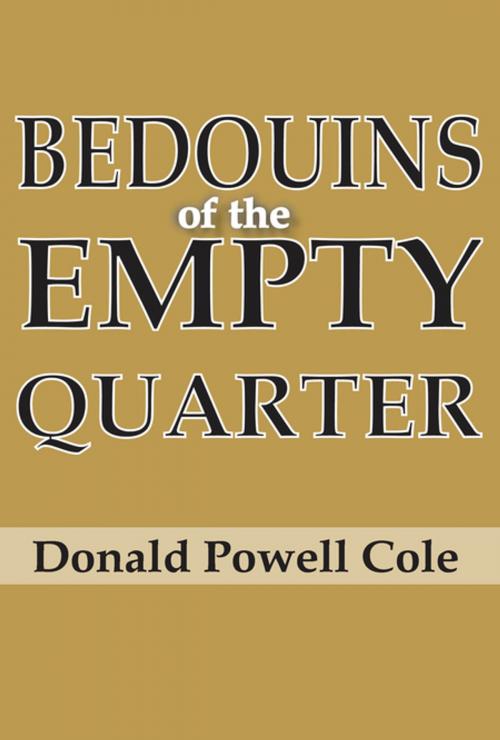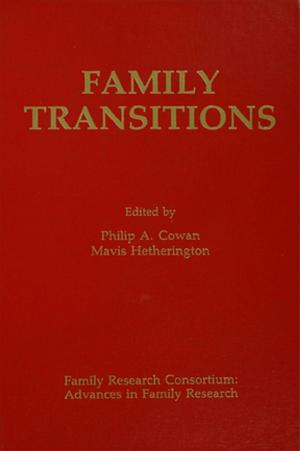| Author: | Donald Powell Cole | ISBN: | 9781351314626 |
| Publisher: | Taylor and Francis | Publication: | July 28, 2017 |
| Imprint: | Routledge | Language: | English |
| Author: | Donald Powell Cole |
| ISBN: | 9781351314626 |
| Publisher: | Taylor and Francis |
| Publication: | July 28, 2017 |
| Imprint: | Routledge |
| Language: | English |
This volume describes Bedouins, a tribal pastoral people in eastern Saudia Arabia. This volume documents changes in their way of life, beginning in the 1930s and continuing to the 1960s, when this book originally appeared. The Empty Quarter described here is a place inhabited by a people so thoroughly devoted to their pastoral pursuits that they are referred to as nomads of the nomads. To the Al Murrah and other camel-keeping pastoralists, theirs is a rich and rewarding life. For either to survive, men and camels must live in close symbiosis. The camels provide food, fiber, and transport; man provides knowledge of available resources, of which the most precious are water and the grasses that grow where rains have fallen. In this work, Donald Powell Cole shows us that this existence more complex and intricate. There is the complex knowledge of the desert itself, its varieties, moods, and resources. Next, there is the knowledge of the camels, their needs, capacities, and the peculiarities of each animal. These different kinds of knowledge must be brought together to fully use, yet carefully conserve, scarce resources. As important is the structuring of social life. The tribesmen must have a flexible social system that enables the individual household to operate alone when the environmental situation requires. This necessitates a pattern of independence and equality. The Al Murrah live according to ancient traditions, but life is not unchanging. In 1932, Saudi Arabia became a nation and intertribal raiding and warfare was brought to an end. Cole highlights the adaptability of the Al Murrah as the desert became increasingly invaded by motor transport and oil rigs. He sees their experience as prototypical: man everywhere must attune his life to the requirements of his economy. In a place like the Arabian Desert these adjustments are most insistent. This work shows that even when these demands of the external world pervade behavior, life can remain rich and rewarding.
This volume describes Bedouins, a tribal pastoral people in eastern Saudia Arabia. This volume documents changes in their way of life, beginning in the 1930s and continuing to the 1960s, when this book originally appeared. The Empty Quarter described here is a place inhabited by a people so thoroughly devoted to their pastoral pursuits that they are referred to as nomads of the nomads. To the Al Murrah and other camel-keeping pastoralists, theirs is a rich and rewarding life. For either to survive, men and camels must live in close symbiosis. The camels provide food, fiber, and transport; man provides knowledge of available resources, of which the most precious are water and the grasses that grow where rains have fallen. In this work, Donald Powell Cole shows us that this existence more complex and intricate. There is the complex knowledge of the desert itself, its varieties, moods, and resources. Next, there is the knowledge of the camels, their needs, capacities, and the peculiarities of each animal. These different kinds of knowledge must be brought together to fully use, yet carefully conserve, scarce resources. As important is the structuring of social life. The tribesmen must have a flexible social system that enables the individual household to operate alone when the environmental situation requires. This necessitates a pattern of independence and equality. The Al Murrah live according to ancient traditions, but life is not unchanging. In 1932, Saudi Arabia became a nation and intertribal raiding and warfare was brought to an end. Cole highlights the adaptability of the Al Murrah as the desert became increasingly invaded by motor transport and oil rigs. He sees their experience as prototypical: man everywhere must attune his life to the requirements of his economy. In a place like the Arabian Desert these adjustments are most insistent. This work shows that even when these demands of the external world pervade behavior, life can remain rich and rewarding.















